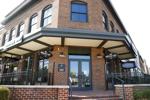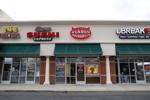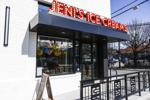Share this article paywall-free.
When Paul Martin and his wife recently treated themselves to a night out at The Boathouse at Short Pump Town Center, they were surprised when they were charged an automatic 20% service charge.
“It turned out to be the most expensive restaurant bill I’ve ever had at nearly $300,” Martin said.
Many diners in the Richmond area have been seeing similar charges on their restaurant bills.
Customize your experience so you see the stories most important to you. And sign up for personalized notifications so you don’t miss any important news.
TO DOWNLOAD
For Android users: https://go.richmond.com/googleplay
For Apple users: https://go.richmond.com/apple
A service fee is automatically added to the restaurant bill, pre-tax, by the restaurant. The service fee is typically 18% to 20%, locally. The service fee is often pooled and distributed evenly among the staff, from dishwashers to bartenders.
But there is confusion with these fees. Patrons are often told they can tip on top of the service fee for exceptional service. Also, restaurant owners have the flexibility to use service fees however they like, which means the server does not always get the full 20%.
People are also reading…
“For the most part, (the addition of service fees at restaurants) is to defray the massive increase in their labor and food costs,” said Eric Terry, president of the Virginia Restaurant, Lodging & Travel Association. “The reality is that their costs have grown dramatically in the last two to three years.”
Regardless, the experience left a bad taste in Martin’s mouth, as it does for many restaurant patrons.
Martin said he does not plan to return to The Boathouse or to any other restaurant with an automatic service charge.
Island Shrimp Co. is part of the HOUSEpitality restaurant group that has instituted a 20% service fee to all checks.
Other fees are also starting to pop up on restaurant bills, such as credit card fees of 3% for patrons using credit cards, or take-out fees of $1 to $2 to pay for paper bags, containers and utensils.
“Going out to eat is starting to feel like booking an Airbnb. You order two $10 sandwiches and the bill turns out to be $40,” said Austin Stokes of Richmond. “Getting slapped with all types of fees at the end of a meal definitely dampers the experience.”
Many diners are left wondering: What are these fees? Why are they being added? Where do they go? And should I tip on top of a service charge?

Nama restaurant is part of the LX Group, which has instituted an 18% service fee on all checks. According to Kunal Shah, a managing partner at the LX Group, the full 18% is allocated to staff.
Why service fees are being added
Service fees started gaining traction locally after the pandemic, when restaurants were struggling with the impact of COVID-19, being shuttered for months and facing myriad challenges when they reopened.
Staffing shortages, the increase in the minimum wage, inflation, supply chain issues and an industry shift toward providing employment benefits and a living wage are just a few of the many challenges restaurants are confronting.

Diners enjoy a meal outdoors on Cary Street on May 23.
The LX Group, which manages Kabana Rooftop, Switch and Nama, has instituted an 18% service charge at its restaurants.
“We have moved to this system to ensure more competitive wages to our staff as well as give us longevity with staff since turnover has been a huge challenge since COVID. This model has allowed us to provide a more consistent and higher hourly wage to staff,” said Kunal Shah, a managing partner at the LX Group. According to Shah, the full 18% is allocated to the staff.

Bartender Zaylu Gonzalez makes a drink at Kabana Rooftop bar in 2016. The LX Group, which manages Kabana, Switch and Nama, has instituted an 18% service charge at its restaurants.
Likewise, Kevin Healy, owner of The Boathouse as well as Casa del Barco and Island Shrimp Co., said the HOUSEpitality restaurant group added the 20% service fee “as a way to guarantee a wage to our service staff. It’s a step in the right direction to professionalize the industry.”
According to the Virginia Department of Labor and Industry, Virginia’s minimum wage for tipped employees is $2.13 per hour, and it applies to workers who typically receive more than $30 per month in tips.
Employers must pay the difference if that wage and tips do not meet Virginia’s minimum wage of $12 per hour, which went into effect on Jan. 1. Consequently, labor costs for restaurants have gone up between 30% and 40%, Terry said.
The median hourly wage for Richmond-area servers (a figure that should include tips) is $13.76, which adds up to $28,620 per year (if a server works 40 hours a week for all 52 weeks).
At The Boathouse, with the service fee now in place, servers typically make around $20 per hour or higher, which is significantly higher than the average wage.
“We wanted to come up with a reasonable and fair compensation. We distribute it in a way so that (our staff) can have a professional income. They can buy a car, rent an apartment or take a vacation. They can plan and not be dependent on the whim of guests,” Healy said.
Most restaurants that include a service fee notify guests in small print on the menu, on websites or verbally through the server.
“People have been complaining about ‘paying servers a living wage,’ and then balk when menu prices go up. A way to fix that is to charge a service charge, usually 18 to 20%,” said Marla Gallaher, a local server. But, she said, that 20% is not usually passed straight on to the server the way a tip would be. “It is collected by the restaurant and used to provide the higher hourly wages.”
“The public doesn’t always understand why tipping is so crucial. If a server is not tipped appropriately,” they cannot pay their bills, she said.
Differing viewpoints and cancellation fees
Not every restaurant is implementing these fees.
“If the service staff knows their product, times the delivery and assists in a five-star manner, they will probably receive more than 20% in the long run,” said Ann Butler, owner of 21 Spoons restaurant in Midlothian, which was recently named the “Best Locally Owned Restaurant in Virginia” by Southern Living magazine.
There were nearly 8,000 people employed as restaurant servers in the Richmond metropolitan area as of May 2022, according to the Bureau of Labor Statistics.
Many servers earn more than the median server wage, depending on where they work and the tips they get. “The restaurant where I work does not charge a service fee, and I make well over minimum wage,” Gallaher said.
21 Spoons has, however, started collecting a credit card for reservations and charging a $10 per person fee for no-shows without a 12-hour notification.
“With only 14 tables, this has become a necessity for us. We just wanted to make sure everyone was getting an opportunity to solidly reserve a dinner table,” Butler said, considering the interest in 21 Spoons since the Southern Living article.
Grisette, a small restaurant in Church Hill, also collects a credit card for reservations and charges a $25 fee for no-shows if the reservation is not canceled by noon on the day of the reservation.
For years, dentists’ and doctors’ offices have charged cancellation fees. Now, restaurants are adopting the practice, seeing it as another way to recoup lost income.
“Restaurants operate on razor-thin margins,” the VRLTA’s Terry said. The average restaurant profit margin usually falls between 3% and 5%. “Their margins are so slim, they can’t absorb the increases they’ve had.”

The Boathouse at Short Pump Town Center is part of the HOUSEpitality restaurant group that has instituted a 20% service fee to all checks. Kevin Healy, owner of The Boathouse as well as Casa del Barco and Island Shrimp Co., said the group added the fee “as a way to guarantee a wage to our service staff. It’s a step in the right direction to professionalize the industry.”
‘We won’t eat there’
No matter how much service fees may be needed and necessary, by and large, consumers hate them.
“Very simply, I will discontinue going to Richmond restaurants,” said Linda Shelton, a self-described “foodie” in the Fan. “We choose to use a tipping protocol to reward good service and not to pay the ‘staff’ per say. That is the responsibility of the owner.”
Others believe the increase in costs should be added to the menu items.
“I urge restaurants to please account for labor costs in the menu pricing rather than forcing it onto the consumer. Any restaurant we get blindsided by, we’ll not be in a rush to eat at again,” said Jonathan Nedin of Chesterfield County. “As a consumer, I’d highly prefer to see the prices increased to meet the rising cost of business, and ideally the wages of the employees increased as well. I’d rather know what the true price is so I can make informed selections.”
However, menu prices have already increased nearly 8% in the past 12 months, according to a survey from the National Restaurant Association. Many restaurants say they continually adjust menu prices to reflect rising food costs.
Even with inflation starting to taper off, the Producer Price Index for all foods remained 28% in April, above its pre-pandemic level.
With these rising costs, diners are starting to take notice, with fewer people going out to eat.
Between March 2022 and March 2023, 38% of restaurant operators saw their customer traffic decline, according to the National Restaurant Association.
Add to that the many restaurants that did not survive the challenges of the pandemic.
“We believe 20% of restaurants have closed in Virginia during the pandemic,” the VRLTA’s Terry said.
Last year, over 15 restaurants closed in the Richmond area, with several such as Perch and Lady N’Awlins Cajun Café citing challenges caused by the pandemic as the reason.
“Richmond’s a great city with a rich restaurant scene. We’ve all got to adapt to the conditions we are now in,” said Dan Coakley, a former Richmond server. “For restaurants, that might mean adding a service charge. For diners, that might mean reserving eating out for special occasions and going to the grocery store more often.”
Richmond area restaurants opened in 2023
Slay Burgers

At Slay Burgers, the new smash burger take out spot at 22 W. Brookland Park Boulevard: The Big Ounce burger, a double smash burger with cheese, onion rings, bacon and BBQ sauce.
Mariscos Mazatlan

The general manager of Mariscos Mazatlan is Julio Galeana.
A Taste of Nostalgia

Lovers of cereal can get their fix with over 30 varieties at A Taste of Nostalgia (1420 N. Parham Road) in Regency mall.
88 Street Food

Popular drinks, including matcha milk tea, fruit tea and Vietnamese coffee are also on the menu.
Acacia Midtown

Acacia Midtown opened its new location at Libbie Mill-Midtown with high ceilings, basket chandeliers, and its signature dishes at 2363-105 Roux St.
Odyssey

Odyssey, the eagerly anticipated seafood restaurant from the Alewife team, opened at 6619 Patterson Ave.
Lost Letter RVA

The front room of the Scott’s Addition restaurant had been converted into Lost Letter, an “Easy Italian” restaurant. 2939 W. Clay St.
Slurp!

Slurp!, a ramen and noodle restaurant from The Jasper team, is now open in Union Hill at 2416 Jefferson Ave.
Stanley’s

Stanley’s, a Philly-inspired hoagie spot, recently opened in the former home of Robin Inn at 2601 Park Ave.
Hibachi House

The owners of Hibachi Box have opened Hibachi House at 3456 Lauderdale Drive in the Shops at Wellesley.
Main St. Dragon

Main St. Dragon opened in the former Foo Dog space at 1537 W. Main St. with much of the same staff, new dishes and lower prices.
Nokoribi

Nokoribi, a Japanese pub inspired yakitori, is now open in The Veil Brewing Co.’s new taproom at 1509 Belleville St. in Scott’s Addition. Nokoribi comes from the owners of Longoven.
Urban Myth Street Food

A rice bowl with bulgogi beef and chicken skewers are among the offerings of Buskey Cider’s new food truck, Urban Myth Street Food.
Revel Market & Bar

Revel Market & Bar from Julep’s rolls into North Side at 6223 Lakeside Ave. with tapas and craft cocktails.
Genova’s Pizza Station & Take Out Kitchen

Genova’s Pizza Station & Take Out Kitchen opened at 723 Buford Road in Bon Air on April 19, 2023. This is the newest venture from the owners of Casa Italiana and Pizza Express, over 4 years in the making.
Brick House Diner

Brick House Diner opened in the former Kitchen 64 space at 3336 Arthur Ashe Blvd.
Mayu Sushi & Thai

Thai Diner Too, the Carytown mainstay at 3028 W. Cary St., has rebranded at Mayu Sushi & Thai.
Wok This Way

Wok This Way Asian street food is now open at 13 W. Broad St.
Boiling Crab Richmond

The Boiling Crab Richmond is now to open at 2053 W. Broad St., Richmond, in March 2023. The Orange County, California-based chain has 25 locations in the U.S., as well as Australia, China, and Saudi Arabia. The Richmond location was previously Cornerstone Cigar Bar.
Torchy’s Tacos

Torchy’s Tacos opened two locations the Richmond area this year, one in Short Pump at 11120 W. Broad St., another in Carytown Exchange at 3510 W. Cary St., Suite C110, with a third on the way in Chesterfield.
Raising Cane’s

Raising Cane’s opened its second area location at 1321 Huguenot Road in Midlothian. More locations are on the way, including 6921 Lake Harbour Drive in Midlothian and 12721 Jefferson Davis Highway.
ChefSuite

ChefSuite, new ghost kitchen and virtual food hall, is now open 4711 W. Broad St. The space launched with three restaurants: Latin Quarter Kitchen, A Pinch of Sugar and On A Roll Italian Subs. Each restaurant is available for pickup or delivery.
BigWife’s

BigWife’s Mac n’ Cheese brick-and-mortar shop is now open at 1017A N. Arthur Ashe Boulevard in Scott’s Addition.
La Fogata

La Fogata Coffee & Grill (6006 W. Broad St.) is a new restaurant concept attached to El Rey Latino market.
The Brass Tap

The Brass Tap opened in Libbie Mill at 4901 Libbie Mill E Blvd Suite 100. It has a focus on beer with 60 beers on tap, plus 20 bottled beverages.
Penny’s Wine Shop

Penny’s Wine Shop opened a retail space and restaurant at 405 Brook Road. Pictured here: Korean beef short rib with sweet potatoes, scallions and sesame seeds.
Grit Coffee

Grit Coffee Roasting Co. opened a second Richmond location in The Otis, the mixed-use development at 1601 Roseneath Road in Scott’s Addition.
A.M. Kitchen Company

A.M. Kitchen Company opened on the VCU campus at 815 W. Cary St. It serves menus from six different restaurants including Da Best Damn Breakfast, Breakfast Chick, Flapjack Hut, Bite Me, Mr. Beast Burger and Pardon My Cheesesteak, all under one roof.
Verseau Bistro

The owner of Say Cheese…cake! has opened Verseau Bistro at Stony Point Fashion Park.
Chic’n & Beer

Located in the former home of Brewhouse (1800 W. Main St.) in Shockoe Bottom, Chic’n & Beer’s menu features chicken wings with eight different sauce options, chicken tenders, chicken sandwiches, biscuits and Cajun-style sides.
Bar West

Cocodrilo (5811 Grove Ave.) revamped and changed its concept to Bar West, a more approachable, neighborhood concept with a bigger bar program and casual eats that draw in more everyday diners.
Sidecar Cocktail Lounge

A new cocktail lounge concept and rum bar opened in Midlothian at 3730 Winterfield Road, Suite 200.
Soul N’ Vinegar

Michelle Parish and William Rimell are with Soul N’ Vinegar offer grab-and-go soul food in Church Hill at 2910 Q St.
Wong’s Tacos

Wong’s Tacos opened in the Winterfield Shopping Center in Midlothian next to Triple Crossing Brewery at 1106 Winterfield Crossing.
Elegant Cuizines

Elegant Cuizines serves Theresa Headen’s West African creations at 415 W. Grace St.
Rio Grande Tex-Mex Grill

Rio Grande Tex-Mex Grill opened at 10445 Midlothian Turnpike with fresh homemade flour tortillas.
Mi Casita Restaurant

Mi Casita Restaurant opened at 2606B Broad Rock Blvd.
Blue Cow Ice Cream Co.

Blue Cow Ice Cream Co. opened its second Richmond-area location in Short Pump in the Greengate Shopping Center, 12171-C W. Broad St.
Suzy Sno

Suzy Sno’s new location in Carytown at 3423 W. Cary St. is now open.
Diablo Doughnuts RVA

Diablo Doughnuts RVA, located at 1090 Virginia Center Parkway, Suite 105, in Glen Allen, hosted its grand opening Feb. 11.
Jeni’s Splendid Ice Creams

Jeni’s Ice Cream in Carytown at 3500 W. Cary St. in Richmond.
Colleen Curran (804) 649-6151
@collcurran on Twitter
Richmond Times-Dispatch data journalist Sean McGoey researched and contributed to this story.


